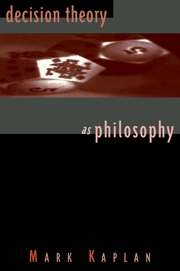Book contents
- Frontmatter
- Contents
- Preface
- Note to the Reader
- CHAPTER ONE Confidence
- CHAPTER TWO Evidence
- CHAPTER THREE The Bayesian Challenge
- CHAPTER FOUR Rational Belief
- CHAPTER FIVE The Bayesian Canon
- CHAPTER SIX Decision Theory as Epistemology
- APPENDIX 1 Principles and Definitions
- APPENDIX 2 Proofs
- APPENDIX 3 Probabilism – Some Elementary Theorems
- Bibliography
- Index
CHAPTER FOUR - Rational Belief
Published online by Cambridge University Press: 05 June 2012
- Frontmatter
- Contents
- Preface
- Note to the Reader
- CHAPTER ONE Confidence
- CHAPTER TWO Evidence
- CHAPTER THREE The Bayesian Challenge
- CHAPTER FOUR Rational Belief
- CHAPTER FIVE The Bayesian Canon
- CHAPTER SIX Decision Theory as Epistemology
- APPENDIX 1 Principles and Definitions
- APPENDIX 2 Proofs
- APPENDIX 3 Probabilism – Some Elementary Theorems
- Bibliography
- Index
Summary
The Bayesian Challenge Revisited
Let me pose the question with which I ended the last chapter in a slightly different way. As I tried to make clear in the ultimate sections of chapters 1 and 2, the Bayesian approach to epistemology – the enterprise of seeking to settle epistemological questions by looking at their mirror-images in questions about the rationality of preferences – cannot provide an adequate epistemology by itself. Modest Probabilism imposes nothing but a consistency constraint on confidence rankings. Evidence supplies nothing over and above a consistency constraint on when you may regard something as a hypothesis that, if true, is evidence that another is true. Neither imposes any constraint whatsoever on how you may change your confidence rankings or on how you may evaluate the strength of the evidence one hypothesis, if true, will provide for the truth of another.
The Bayesian approach to epistemology provides no more than a down payment on an adequate epistemology. The rest will have to come from more traditional sources: reflection on our practices of inquiry and independent methodological and epistemic insights (perhaps among others). But even if the Bayesian approach provides nothing more than a down payment on a fully adequate epistemology, it does appear to fix the currency in which the balance must be paid. It is the coin of methodological and epistemic insight into the rational investment of confidence in which the outstanding balance acknowledged to date demands payment.
- Type
- Chapter
- Information
- Decision Theory as Philosophy , pp. 102 - 154Publisher: Cambridge University PressPrint publication year: 1996

